African Peacocks
These fish do not reflect our current stock, these Profiles are for your information only. For in stock fish please check out our link to our Facebook page or call (734-479-5100) for more information. Thank you.
Male Albino Eureka Jake (Aulonocara jacobfreibergi "Eureka Albino")
| |||||
Male Albino Strawberry (Aulonocara "Albino Strawberry")
| |||||
Male Albino Sunburst (Aulonocara "Albino Sunburst")
| |||||
| |||||
| |||||
Male Chitande (Aulonocara ethelwynnae) Also known in the aquarium hobby as the Northern Aulonocara.
Male Eureka Jake (Aulonocara jacobfreibergi "Eureka") This variant of jacobfreibergi does not occur in the Lake Malawi but instead is a line-bred (not hybrid) strain of the race from Otter Point, Malawi.
Male Flavescent (Aulonocara stuartgranti (Usisya)) This Peacock has crisp black on the dorsal, anal, and pelvic fins, with the bright yellow body and blue highlights mixed in, topped off with a blue head
Male German Red (Aulonocara "German Red") The German Red Peacock is not a hybrid but has been line bred from the Chipoka race of Aulonocara sp. ''Stuartgranti Maleri".
| |||||
Male Lwanda (Aulonocara sp. "Lwanda") Also known in the aquarium hobby as the Red Top peacock.The Lwanda is one of the popular peacocks for anyone's tank. Dark Blue body highlighted in redish-orange around the fin edges.
| |||||
Male Lemon Jake (Aulonocara jacobfreibergi (Undu Reef)) There are several variants of this popular Aulonocara species in the hobby, including Eureka, Mamela, Otter Point, Hongi Island, Cape Kaiser, Lemon Jake, and several others. These should NOT be housed together as they will readily cross-breed.
| |||||
Male Manson's Peacock (Aulonocara masoni ) It is unique in that it shares a location with another, closely related A. stuartgranti member - Aulonocara maulana. Masoni are characterized by an overall blue body color with orange ventral fins.
| |||||
Male New Yellow Regal (Aulonocara baenschi) Also known in the aquarium hobby as the Benga Peacock. Males of this species take on a strong yellowish-orange color with irridescent blue around their jaw.
| |||||
Male
This variant of the stuartgranti is found near Mdoka, Lake Malawi. Adults grow to sizes of 3-5", with males obtaining the bright metallic blue with an orange/red flush, extending from the shoulder to the caudal fin. Males from Ngara are characterized by a fire engine red while those from Mdoka have a reddish-orange flush. Each Ngara Flametail, whether from Ngara or Mdoka, are unique in that no two seem to display the same degree of red or orange.
| |||||
Males
The ''OB Peacock'' is a hybrid fish, created from a cross between a peacock & an mbuna. Which two fishes exactly is unknown and probably variable since there is so much variation in coloration, shape, size, dentition, & disposition between individuals.
| |||||
Male Otter Point (Aulonocara jacobfreibergi (Otter Pt.))
Male Orange Collar Gertrude (Aulonocara gertrude) Also known as the Aulonocara Multispot peacock. Males in the north have a bright orange patch on the shoulder, which is absent in southern populations. Females are readily recognized by the yellow spots on the anal fin and yellow ventral fins. The northern populations take up residence in the intermediate zone while those in the south forage for food mainly along sandy and muddy bottoms near river mouths.
| |||||
Male Peter Davisae Peacock This stunning peacock is mainly blue with a yellow underside and vertical bars along the body.
Male Red Shoulder (Aulonocara stuartgranti )
| |||||
Male Red Orchid (Aulonocara "firefish")
| |||||
Male Roberti (Aulonocara "roberti")
| |||||
Male Saulosi (Aulonocara saulosi )
| |||||
Male Sunshine (Aulonocara sp. "Stuartgranti Maleri" )
| |||||
African Haplochromines
Male 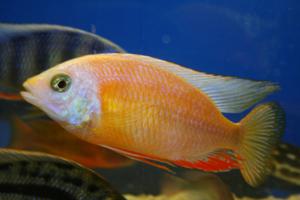
_crop_233x225.jpg) Juveniles
Juveniles
Albino Taiwan Reef (Protomelas sp. "Steveni Taiwan" (Albino))
They have a fuller and shorter body than most Haps. Suitable tank mates are the Peacocks and smaller, milder Haps like the Copadichromis and Otopharynx species. The tank should have rocks, but preferably those with no sharp edges. Prot. species are a little clumsy and can get scratched easily.
Native Range: Aquarium Strain
Max. Length: 7 inches
Temperament: Peaceful
Feeding: Herbivore
Temperature: 78-82°F
pH: 7.8-8.6
Male _300x200.jpg)
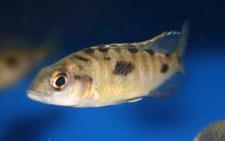 Juvenile
Juvenile
Aristochromis Red Top (Otopharynx lithobates )
This species lives in large caves and scavenges material lying on the rocky substrate. This fish has several geographic variants, with the one from Zimbabwe Rock being the most popular in the hobby.
Native Range: Southern part of the lake, around the Nankoma Peninsula
Max. Length: 5.5 inches
Temperament: Mildly Aggressive
Feeding: Omnivore
Temperature: 78-82°F
pH: 7.8-8.6
Male 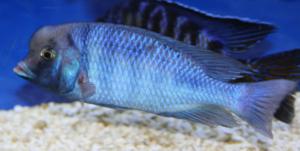
_crop_268x225.jpg) Juvenile
Juvenile
Blue Dolphin (Cyrtocara moorii)
The Malawi Blue Dolphin is also known as Moori and is a hap cichlid originating in shallow waters and sandy substrates of Lake Malawi. The reference to 'dolphin' in the name is related to the nuchal hump on its head and shape of its mouth.
Native Range: Lake-wide distribution in Lake Malawi & also found in Lake Malombe.
Max. Length: 9 inches
Temperament: Mildly Aggressive
Feeding: Omnivore
Temperature: 78-82°F
pH: 7.8-8.6
Male _300x200.jpg)
_300x200.jpg) Juveniles
Juveniles
Deep Water Hap (Placidochromis electra )
The common name is derived from the fact that it was previously thought to be found only in much deeper water than we now know it inhabits. In nature it feeds from the surface of the substrate on invertebrates and other morsels stirred up by the action of digging substrate feeders. It is also peaceful with members of its own species although it does become mildly territorial when breeding. It is better to keep several females per male.
Native Range: From Chiwindi to Mara Point, Mozambique & Lumessi Mozambique to Ntekete Malawi
Max. Length: 6 inches
Temperament: Peaceful
Feeding: Omnivore
Temperature: 78-82°F
pH: 7.8-8.6
Male 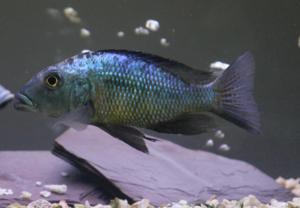
_crop_300x183.jpg) Juveniles
Juveniles
Malawi Sand Diver (Fossorochromis rostratus)
In the wild, groups of up to 50 individuals have been observed, with only 1 male showing dominant coloration. Colors are metallic appearing and can range from purple, to green, to yellow, to blue, & turquoise. Individuals often bury themselves in the sand (if provided) when trying to avoid capture, both in the wild & in the aquarium.
Native Range: Lake Malawi
Max. Length: 16 inches
Temperament: Peaceful
Feeding: Omnivore
Temperature: 78-82°F
pH: 7.8-8.6
Male 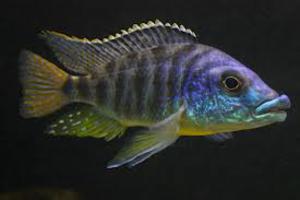
Maleri Thick Lip (Protomelas ornatus)
Females and non colored males are grayish-beige with an evident dark brown lateral line and an irregular squared pattern at the upper part of the body. Colored males are mostly blue with greenish-blue cheeks and yellow belly. The dorsal fin has a distinct yellow and white seem, the anal and pelvic fins are yellow. Adult specimens of both sexes have exceptionally enlarged and fleshy lips. The enlarged lips of P. ornatus are laterally compressed as is its body. It feeds on small mbuna found in the intermediate zones as well as small invertebrates. Its laterally compressed lips are designed to seal off slits and grooves, not round holes. It therefore will turn 90-degrees before striking so as to gain access to sideways slits.
Native Range: Lake Malawi
Max. Length: 9 inches
Temperament: Mildly Aggressive
Feeding: Carnivore
Temperature: 78-82°F
pH: 7.8-8.6
Male 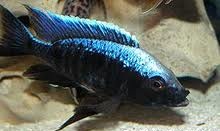
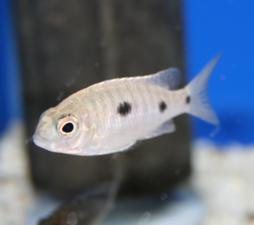 Juvenile
Juvenile
Mloto Likoma (Copadichromis trewavasae)
C. trewavasae belongs to the group of cichlids known as Utaka, which are true open water species. Utaka species, including C. trewavasae, feed on the zooplankton found in the open water column. Males and females forage together throughout the year and only during a short breeding period do they migrate in masses inshore to spawn. Copadichromis trewavasae differs from the other Utaka species in its behavior inasmuch as it is a cave-crater bower builder. In other words, males will construct a large, volcano-like crater out of the sand, but the sandcastle crater is constructed against a rock with a cave burrowed out underneath it. It appears that the cave is the most important part of the sandcastle.
Native Range: Along the Tanzanian coast from Msisi to Manda as well as Cobue, Mozambique.
Diet: Omnivore
Temperament: Peaceful
Maximum Size: 6"
Temperature: 78 - 82°F
pH: 7.8 - 8.6
Male 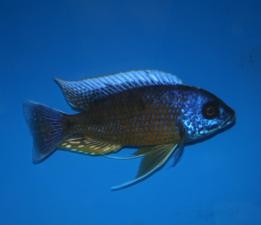
Quad (Copadichromis mbenjii)
Only males display color. Non-breeding males and females have colorless fins and three spots on the flanks. This species closely resembles C. borleyi but differs by its clearly rounded head.
Native Range: Mbenji Island, Malawi
Max. Length: 6 inches
Temperament: Aggressive
Feeding: Omnivore
Temperature: 78-82°F
pH: 7.8-8.6
Male 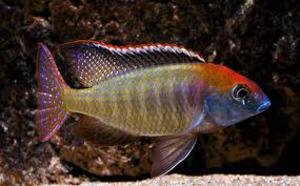
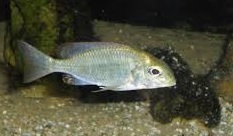 Juvenile
Juvenile
Red Cap Lethrinops (Lethrinops sp. "Red Cap")
They resemble an Aulonocara "peacock" in shape. The coloration of these fish make them stand out as thery are some of the only red/green and purple fish you can find. Like all Lethrinops species, L. sp. "Red Cap" hunts by shoveling and filtering the substrate for food particles.
Native Range: Northern tip of the lake in Tanzania
Max. Length: 4-5 inches
Temperament: Peaceful
Feeding: Omnivore
Temperature: 78-82°F
pH: 7.8-8.6
Male 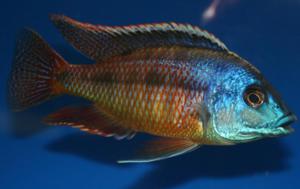
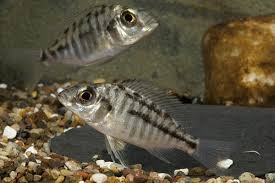 Juvenile
Juvenile
Red Empress (Protomelas taeniolatus (Namalenje Is.))
P. taeniolatus has a lake-wide distribution & is primarily an herbivorous cichlid. It feeds by sucking algae from small pockets in the rocks. Like most cichlids, however, P. taeniolatus is an opportunistic feeder - when plankton is plentiful, it feeds on these as well.
Native Range: Namalenje Island, Malawi
Max. Length: 9 inches
Temperament: Mildly Aggressive
Feeding: Herbivore
Temperature: 78-82°F
pH: 7.8-8.6
Male 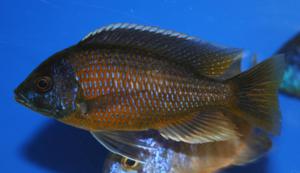
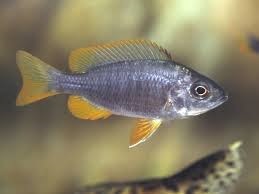 Juvenile
Juvenile
Red Fin (Copadichromis borleyi (Kadango))
An easily kept fish that has several color variations due to where in the lake they were collected. Mature males have a blue face, blue fins and red to orange body. Nicknamed the "Red Fin" because females and juveniles sport red fins, which contrasts beautifully with a grayish black body.
Native Range: Found at nearly every rocky habitat along the shoreline of Lake Malawi
Max. Length: 8 inches
Temperament: Aggressive
Feeding: Omnivore
Temperature: 78-82°F
pH: 7.8-8.6
Male _crop_300x223.jpg)
_300x200.jpg) Juvenile
Juvenile
Taiwan Reef (Protomelas sp. "Steveni Taiwan" (Taiwan Reef))
The Protomelas sp. "Steveni Taiwan" is found in Lake Malawi along the Taiwan Reef, found at the depth of 50 to 100 feet. Males defend territories of this rocky terrain of about 5 feet in diameter. This fish is only located in a few locations within the lake, although the reason why is not known. This highly desirable species has many names. This is due mainly to the fact that Prot. fenestratus is the name for a close relative - the Tangerine Tiger. A more famous close relative is an old favorite: the Red Empress. They have a fuller and shorter body than most Haps. Suitable tank mates are the Peacocks and smaller, milder Haps like the Copadichromis and Otopharynx species.
Native Range: Taiwan Reef, Malawi
Max. Length: 7 inches
Temperament: Peaceful
Feeding: Herbivore
Temperature: 78-82°F
pH: 7.8-8.6
Male 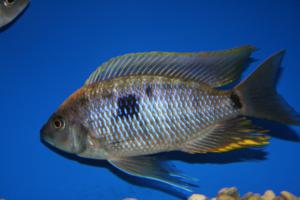
Virginalis Blotch (Copadichromis geertsi)
Males are dark midnight blue with a very attractive gold blaze and very long pelvic fins. Females sport 1-2 darks spots. Males build large cave-crater bowers in the intermediate habitat. This cichlid is rarely exported, owing the difficulty of collecting it at depths greater than 25 meters. Mixes well with other gentle peacocks and Haps.
Native Range: Masinje, Malawi; Meponda & Thundu, Mozambique
Max. Length: 7.5 inches
Temperament: Peaceful
Feeding: Omnivore
Temperature: 78-82°F
pH: 7.8-8.6
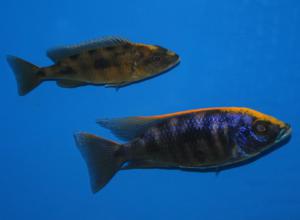 Pair
Pair
Yellow Blaze (Otopharynx lithobates )
The name "lithobates" means rock-dweller, and this is an aptly chosen name since Otopharynx lithobates spends its life in caves and crevices in the rocky parts of Lake Malawi. The Yellow Blaze are a peaceful Hap, being neither bothered or showing aggression toward other fish. Even among themselves, they are quite mild-mannered, only displaying brief flares of fin or a passing nip during spawning rituals.
Native Range: Lake Malawi
Max. Length: 5 inches
Temperament: Peaceful
Feeding: Omnivore
Temperature: 78-82°F
pH: 7.8-8.6
Haplochromines Predators
Male 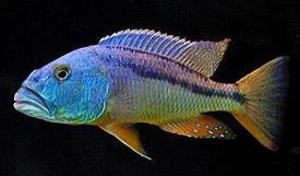
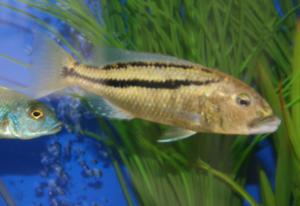 Sub Adult
Sub Adult
Malawi Hawk (Aristochromis christyi)
A. christyi is not a very swift swimmer & prefers rocky niches in which to take cover as well as hunt.The Malawi Hawk is a predator fish from Lake Malawi that hunts and feeds on the Mbuna that live in the rocky shores. It attakcs its prey from a tilted body position, focusing just one eye on the target, while it slowly descends before securing the victim with a sudden sideways stroke. In the aquarium, however, these species readily accept commercially prepared foods, such as flakes, pellets, and frozen foods. It has a unique "aristocratic" or roman nose that easily differentiates this cichlid from others.
Native Range: Lake Malawi
Max. Length: 11 inches
Temperament: Mildly Aggressive
Feeding: Carnivore
Temperature: 78-82°F
pH: 7.8-8.6
Male 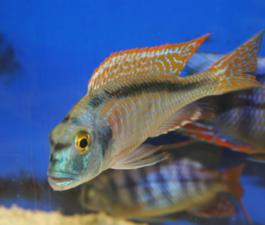
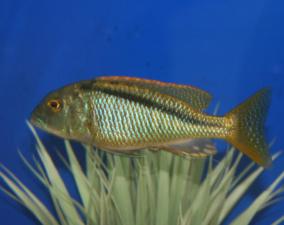 Sub-Adult
Sub-Adult
Buccochromis nototaenia
A species not commonly found in Malawi tanks, this Buccochromis species is a really big Malawi cichlid. Its colors are the usual blue / green / yellow combination found in many Haplochromine species of the Lake and its behavior is the normal behavior expected. Like other Lake Malawi predators this species eats small fish in the wild, mostly Mbuna species.
Native Range: Lake Malawi
Max. Length: 16 inches
Temperament: Mildly Aggressive
Feeding: Carnivore
Temperature: 78-82°F
pH: 7.8-8.6
Male 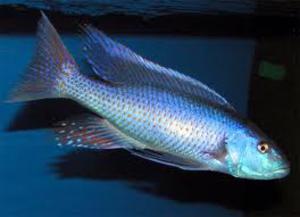
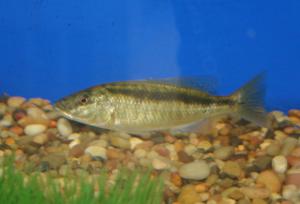 Sub Adult
Sub Adult
Malawi Trout Cichlid (Champsochromis caeruleus)
C. caeruleus is an elongate cichlid with a black oblique stripe (which is ordinarily masked in mature males). The elongated soft rays of the dorsal, anal, and pelvic fins are a distinctive feature of adult males. The teeth in the outer rows of the jaws are widely spaced, unlike those of most similar Malawi cichlids such as species of Buccochromis. In adults these teeth are unicuspid and slightly incurved. C. caeruleus can be confused with C. spilorhynchus, the only other species in the genus Champsochromis; however, C. caeruleus is more elongate.
Native Range: Lake-wide distribution
Max. Length: 18 inches
Temperament: Mildly Aggressive
Feeding: Omnivore
Temperature: 78-82°F
pH: 7.8-8.6
Male 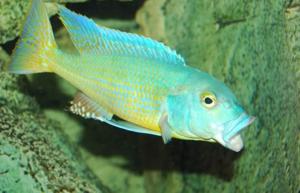
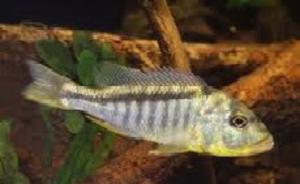 Juvenile
Juvenile
Green Lepturus (Buccochromis lepturus)
The Green Lepturus is another one of Lake Malawi's predator fish. It's not particularly aggressive with anything too large to fit in its mouth. Small fish will definitely end up on the menu. With the exception of Mbuna, it can be kept with most Lake Malawi species growing larger than 5-6 inches.
Native Range: Lake Malawi
Max. Length: 16 inches
Temperament: Mildly Aggressive
Feeding: Carnivore
Temperature: 78-82°F
pH: 7.8-8.6
Male 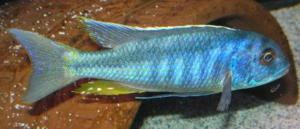
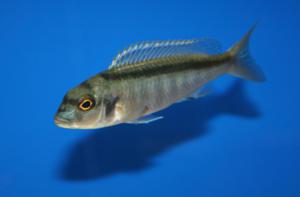 Juvenile
Juvenile
Buccochromis cf. Spectabilis
This species is gaining interest in the hobby at the moment. They are less aggressive and smaller then the rest of the genus. These fish are very slim and stream line and are the smallest in the genus.
Native Range: Tanzania coast of Lake Malawi
Max. Length: 14 inches
Temperament: Mildly Aggressive
Feeding: Carnivore
Temperature: 78-82°F
pH: 7.8-8.6
Male 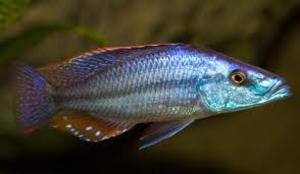
_271x225.jpg) Juvenile
Juvenile
Malawi Eye Biter (Dimidiochromis compressiceps )
D. compressiceps is a large and impressive open-water predator. This fish is constantly on the prowl, and therefore is not territorial, unless preparing to spawn. In appearance, it is typically a whitish-silver with a single brown horizontal stripe on its side. Sexually mature males put on quite a display of colors: electric blue with fluorescent reds and oranges on their fins. Individuals from Chizumulu Is. & Cobue are golden yellow instead of silver. The two other color morphs are Albino and OB, only found in the aquarium. This species preys on juvenile fish hiding among plants. Its laterally compressed body helps it avoid detection. It has a large mouth that can reach out & suck in its prey.
Native Range: Lake Malawi
Max. Length: 11 inches
Temperament: Mildly Aggressive
Feeding: Carnivore
Temperature: 78-82°F
pH: 7.8-8.6
Albino 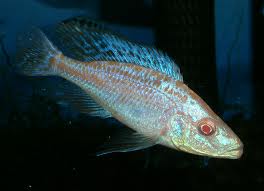
_crop.jpg) OB
OB
Pair 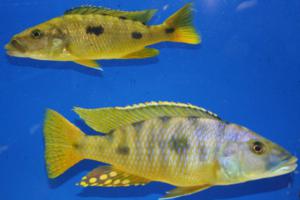
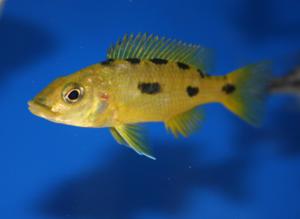 Juvenile
Juvenile
Exo (Exochochromis anagenys)
Courting males have a blue coloration. Females & non-breeding males in the northern half of the lake are yellow with 3 spots while those in the southern half are silver. Its mouth has a unique beak-like shape, being laterally compressed. This adaptation affords a strong grip on its prey, which is caught in a sideways stroke of the head. It hunts mbuna from a tilted angle of the body, probably to prevent detection.
Native Range: Lake Malawi
Max. Length: 13.5 inches
Temperament: Mildly Aggressive
Feeding: Carnivore
Temperature: 78-82°F
pH: 7.8-8.6
Male 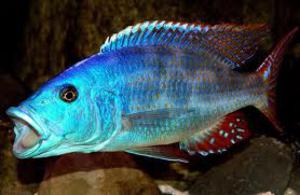
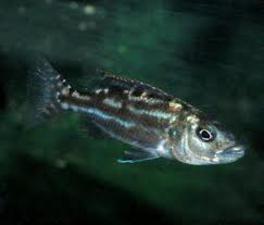 Juvenile
Juvenile
Fusco (Nimbochromis fuscotaeniatus)
It hunts by ambushing small cichlids. It is classified as a Nimbochromis species but is perhaps more closely related to Tyrannochromis nigriventer and may someday be re-classified.
Native Range: South & Western parts of Lake Malawi & Lake Malombe
Max. Length: 12 inches
Temperament: Aggressive
Feeding: Carnivore
Temperature: 78-82°F
pH: 7.8-8.6
Male 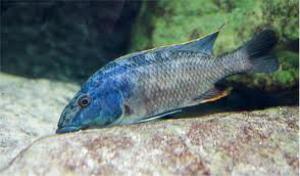
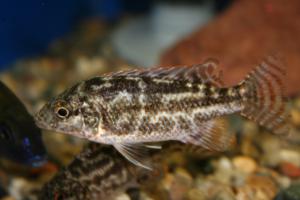 Juvenile
Juvenile
Linni (Nimbochromis linni)
The linni has a unique hunting technique which consists of using its long, protrusible snout to suck small cichlids from cracks & crevices. Sexually active males lose their camouflage and assume a solid blue color.
Native Range: Lake Malawi
Max. Length: 14 inches
Temperament: Mildly Aggressive
Feeding: Omnivore
Temperature: 78-82°F
pH: 7.8-8.6
Freshwater
Related Links
There are no quick links to display at this time...
_300x200.jpg)
_300x200.jpg) Juveniles
Juveniles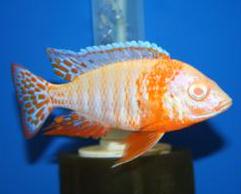
_274x200.jpg) Sub-Adults
Sub-Adults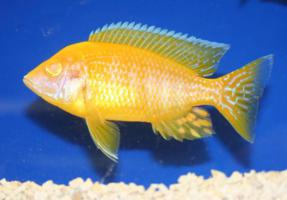
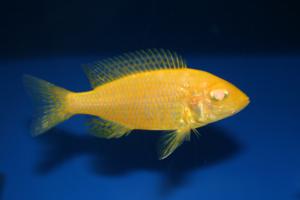 Female
Female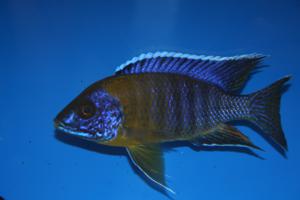
_300x200.jpg) Juveniles
Juveniles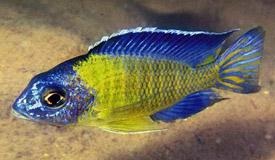
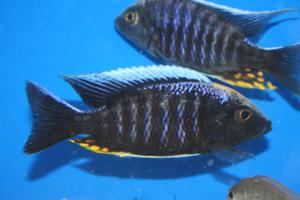
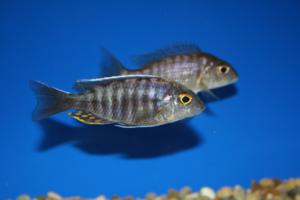 Pair
Pair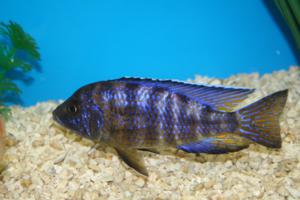
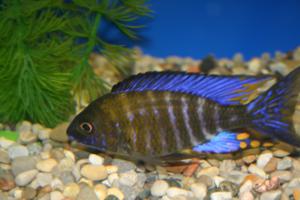
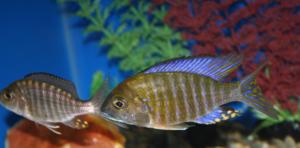 Pair
Pair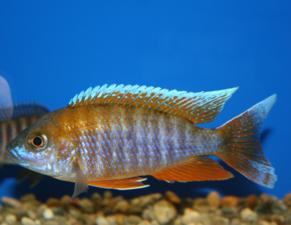
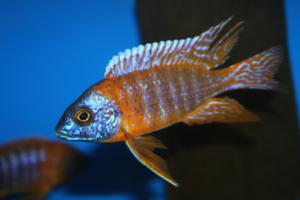 Sub-Adult
Sub-Adult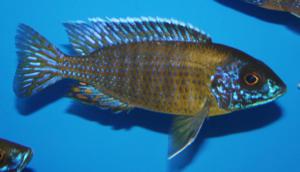
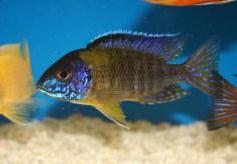 Sub-Adult
Sub-Adult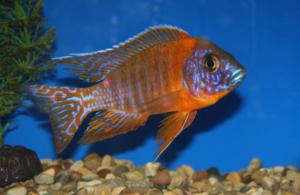
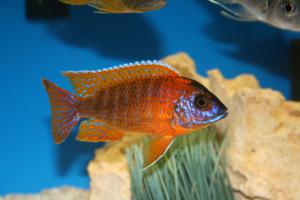 Sub-Adult
Sub-Adult_300x200.jpg)
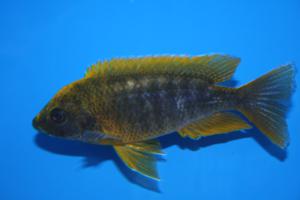
_300x200.jpg) Juvenile
Juvenile_crop_300x211.jpg)
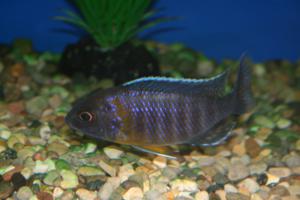 Sub-Adult
Sub-Adult_246x225.jpg)
_300x200.jpg)
_300x200.jpg) Juveniles
Juveniles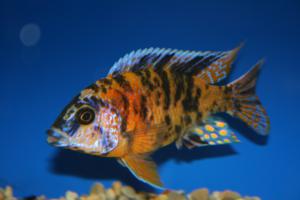
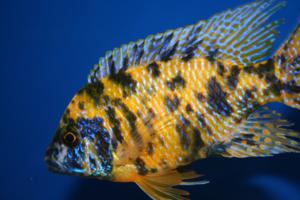
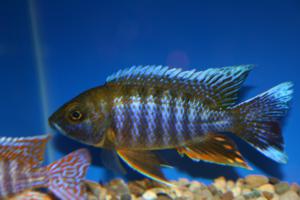
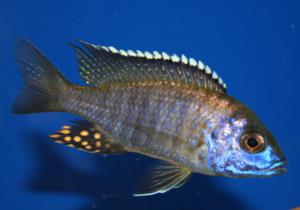
_300x205.jpg)
_309x206.jpg)
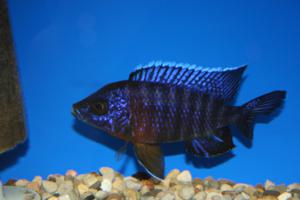
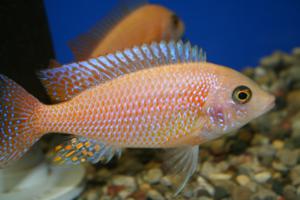
_300x200.jpg)
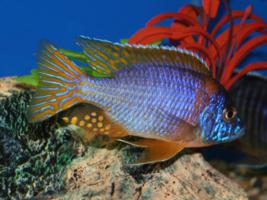
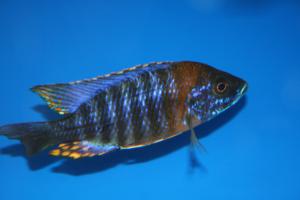
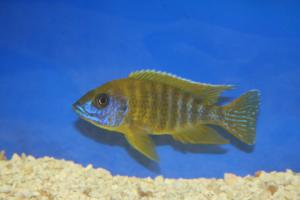
_300x200.jpg) Juveniles
Juveniles
